Cars & Bikes

Reed Richards’ Powers, Weaknesses & Genius: A Complete Character Breakdown
April 15, 2025 20 min read
Reed Richards isn’t just a scientist — he’s the kind of mind that bends the very definition of genius. To the world, he’s Mister Fantastic — a title he wears less like a name and more like a responsibility. Widely regarded as the smartest man on Earth, Reed is a living, breathing polymath — a master of every science you can name and several you can’t. Engineering, chemistry, biology, physics — he doesn't just study them. He speaks them like languages written in the stars.
But brilliance comes at a price.
On a daring mission aboard a stolen spacecraft, the Marvel-1, Reed set out to touch the edge of possibility — accompanied by his closest people: his best friend Ben Grimm, his then-girlfriend Sue Storm, and her fiery younger brother Johnny. They reached for the unknown... and the unknown reached back.
Bathed in unfiltered cosmic radiation, they didn’t return as they left. The universe had rewritten them — twisted physics around their DNA. For Reed, it meant his body could stretch, shift, mold into shapes that defied logic — the living metaphor of flexibility, both in mind and matter.
And from that accident… a family was born.
The Fantastic Four — explorers, protectors, pioneers of the impossible. They didn’t just fight villains. They navigated dimensions, tamed time itself, and stood as humanity’s last line of defense against threats born not of evil hearts, but of science unchained.
At the center of it all stood Reed — a man constantly torn between the wonders of what could be… and the people he loves in the here and now.
The Spark Before the Stretch
The Early Years of Reed Richards
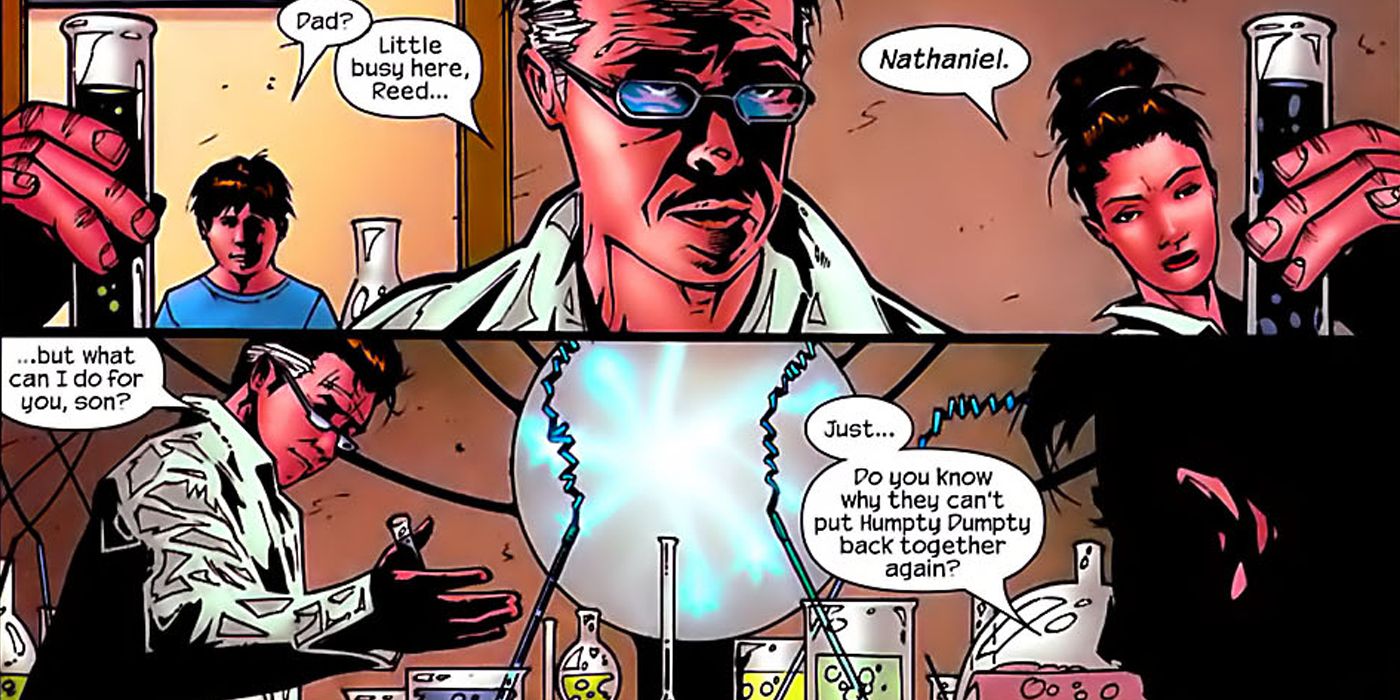
Reed Richards was born into a world already buzzing with equations and invention. The only son of brilliant physicist Nathaniel Richards and his wife Evelyn, Reed came into life not just with a silver spoon, but with the mind of a savant. Central City, California was home — but his real universe was made of formulas, gears, and quiet wonder.
Even as a child, Reed didn't play with toys — he dissected them, improved them. He saw the world not for what it was, but for what it could be. But tragedy struck early: his mother Evelyn passed when he was just seven. The warmth of her love was replaced by the cold silence of absence. Raised solely by Nathaniel, Reed found solace in numbers, in logic, in the unspoken bond between curiosity and creation.
The Making of a Mind
Education and Awakening
Nathaniel, ever the mentor, nurtured his son’s brilliance with precision. Reed wasn’t just ahead of the curve — he was the curve. By fourteen, while most kids were fumbling through adolescence, Reed was already deep into the halls of Caltech. Then Harvard. Then MIT. Then across the sea to the University of Vienna. Every campus, every lab, every lecture — just another step toward the stars.
It was in Vienna that he met Alyssa Moy, a mind as sharp and rare as his own. For once, Reed found a peer who wasn’t playing catch-up — someone who could challenge him, even make him feel...human.
By eighteen, Reed held four degrees in disciplines most people fear to pronounce. But just as his mind reached critical velocity, life spun again. Nathaniel — his rock, his guide — vanished. Swallowed by the secrets of the Brotherhood of the Shield, leaving Reed alone once more. Genius intact. Heart...fractured.
Brotherhood and Rivalry
The Fateful Years at State University
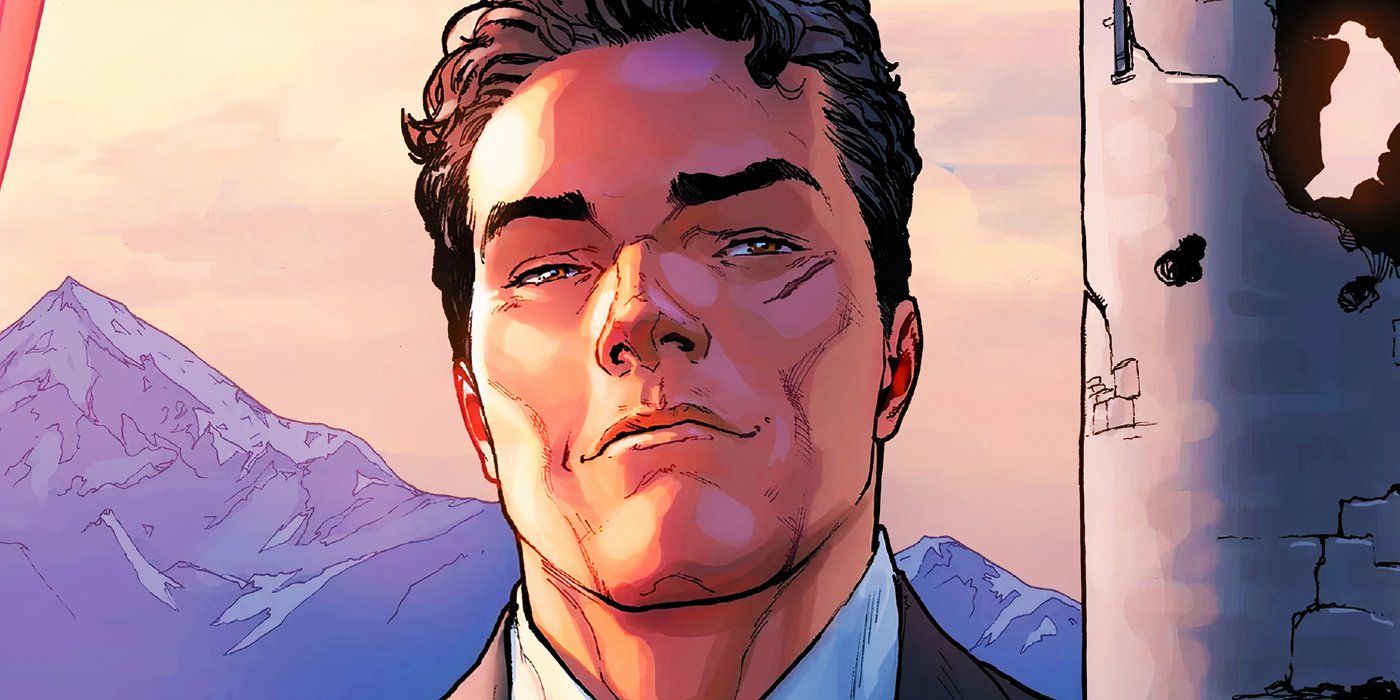
At State University in Hegeman, New York, destiny began laying down its threads. There, Reed met two men who would shape his life forever.
First was Victor von Doom — a man of supreme intellect and equally supreme pride. Cold, regal, and brilliant, Doom saw Reed as a rival from day one. Theirs was not friendship — it was a battlefield of brains. And when Doom’s thirst for forbidden knowledge led to disaster, Reed’s cautious warning became the spark that forged a lifelong vendetta. The accident that scarred Doom’s face was physical — but the wound to his pride cut deeper.
And then there was Ben Grimm. A brawny ex-football player with fists like bricks and a heart made of gold. Reed’s polar opposite, yet somehow the perfect balance. When Reed told him about his dream to build a starship, Ben shrugged and said, "If you ever do, I’ll fly it." A joke at the time — but fate has a way of taking such promises seriously.
In those same years, love quietly entered Reed’s orbit. Renting a room in Manhattan, he crossed paths with a young woman named Susan Storm. Reed, usually so disciplined, found his thoughts straying. She wasn't just a distraction — she was gravity. So strong, in fact, that Reed moved out just to stay focused.
Enemies, Allies, and the Cost of Genius
Though Doom and Richards were never friends, they were two sides of the same cosmic coin. Their debates left professors in awe. When they built a revolutionary computer together, even legends like Einstein and Da Vinci were invoked to describe their synergy. But Doom’s arrogance, unchecked, led him to test dangerous technology alone. Reed spotted a flaw. Warned him. Was ignored. The explosion that followed wasn’t just the birth of Doctor Doom — it was the beginning of a war between two minds destined to clash again and again.
Meanwhile, Reed and Ben served in the military — battle forging a brotherhood that intellect never could. Through grit, loss, and trust earned under fire, their bond became unbreakable.
A Father’s Legacy, A Son’s Purpose
The Final Piece
Three years before Reed’s starship would roar to life, Nathaniel Richards vanished from Earth — lost in time, a self-made voyager swallowed by the future. His departure left behind only mysteries... and two billion dollars. Money meant to secure his son’s legacy. Reed didn’t squander it. He poured it into the dream that had haunted him since childhood — a starship, a gateway to the cosmos, a vessel for human potential.
In Central City, backed by federal funding and the fire of ambition, Reed Richards built the impossible.
All the genius. All the heartbreak. All the connections and collisions — they didn’t just shape a scientist.
They forged a legend.
A man with the mind to challenge the universe, and the heart to save it.
Fantastic Four — The Cosmic Bonds of Reed Richards
Reed Richards wasn’t trying to become a hero. He was trying to build a future. A future where humanity reached beyond its limitations—beyond gravity, beyond fear, beyond the stars. But no matter how many calculations he made, how many degrees he held, or how many formulas he wrote in midnight solitude, the universe had a different equation in mind.
It started with old friends and fragile dreams. Reed reached out to Ben Grimm—a grounded man with sky in his veins, a test pilot with grit carved from war. And to Susan Storm, who wasn't just the girl next door, but a woman who anchored him in a world that often moved too fast for feelings. And then there was Johnny—the impulsive kid brother with fire in his heart, both literally and otherwise. They boarded the Marvel-1 not as superheroes, but as dreamers... rebels against time and red tape.
The launch was desperation disguised as destiny. With government funding slipping away, Reed gambled everything to prove his theories. But the universe doesn’t reward boldness without cost. A cosmic storm—unexpected, relentless—ripped through the ship like a whisper of fate. And when they crashed back to Earth, they were no longer just human. They were something more.
Reed could stretch his body like fluid thought. Ben became stone and sorrow. Sue turned invisible and powerful, while Johnny burst into flame and flight. Their bodies were rewritten, but it was their bond—formed in space, sealed in mutation—that truly transformed them.
Reed didn’t hesitate. He gave them a name: The Fantastic Four. Not for glory, but for purpose. For meaning. For the belief that what changed them could protect the world from what was coming next.
Under his leadership, they ventured into dimensions unknown, fought science twisted into madness, and faced monsters wearing familiar faces. Reed married Sue—amid gods and giants and masked foes watching from the shadows. They had a son, Franklin, born with power that dwarfed theirs, his mind a storm of potential Reed couldn’t fully understand, let alone control. At times, Reed had to make cold decisions—contain his own son, break trust, play God.
That cost him more than once.
Sue left. Hurt, tired, unseen. Medusa stepped in. The team changed, evolved. But somehow, Reed always returned to the center—to Sue, to Ben, to Johnny—to the family that made him more than a scientist. They saved the world again and again, even when the world doubted them. Even when they doubted themselves.
He helped found the Illuminati—a secret brotherhood of minds too brilliant for simplicity. He stood trial before alien galaxies for showing mercy to Galactus. He lost his powers, lost his place, lost his face to Doom. He built a life in hiding. He resurrected the dead. He climbed to Heaven with a machine born of grief and genius, just to bring Ben back.
And when the weight of everything crushed him—when the world turned, when Doom rose, when Hell opened—Reed didn’t become a hero.
He stayed a father. A husband. A leader. A man chasing knowledge not for power, but for peace.
The Fantastic Four fell. They rose. They fell again. But always, they returned—not as saviors in capes, but as a family in flux. Cosmic adventurers who bled, loved, and broke like everyone else… but kept going. Because that’s what Reed Richards taught them:
That science is hope. And love is the strongest theory of them all.
Civil War: Reed Richards and the Fracture of Trust
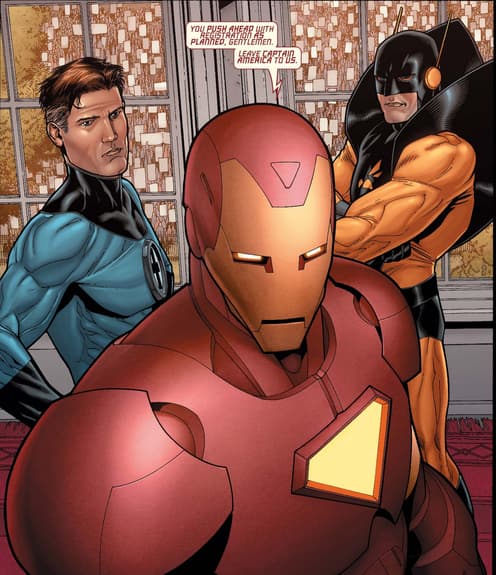
Reed Richards didn’t choose sides out of ego. He chose them out of fear.
During the Civil War, as the superhero community tore itself in half over the Superhuman Registration Act, Reed stood beside Tony Stark—not because he craved control, but because he had seen the math. He had built a working model of Asimov’s Psychohistory, and the numbers haunted him. Without regulation, the collapse of civilization wasn’t a possibility—it was a certainty. Billions dead. Chaos sweeping across the globe. He wasn’t betting on control. He was trying to save everyone.
But logic has no mercy.
His wife, Susan, couldn’t see the equation—she could only see what it cost them. When the clone of Thor—an abomination Reed helped create—murdered Goliath in cold lightning, the fracture wasn’t just in the superhero world. It was in his home. Sue left, taking Johnny with her to the Secret Avengers. Not to punish Reed—but to wake him.
The war ended not with victory, but with heartbreak. In the final clash, Reed threw himself in front of a blast meant for Sue. Taskmaster’s bullet tore into him. He lived. But something deeper had broken.
Sue came back. They had won the war, but lost themselves in the process. So they stepped away—from the team, from the noise—and tried to find their way back to each other. Reed asked T’Challa and Storm to carry the torch of the Fantastic Four while he and Sue remembered what it meant to be Reed and Sue.
But peace never lasts.
World War Hulk: Hunted by the Past
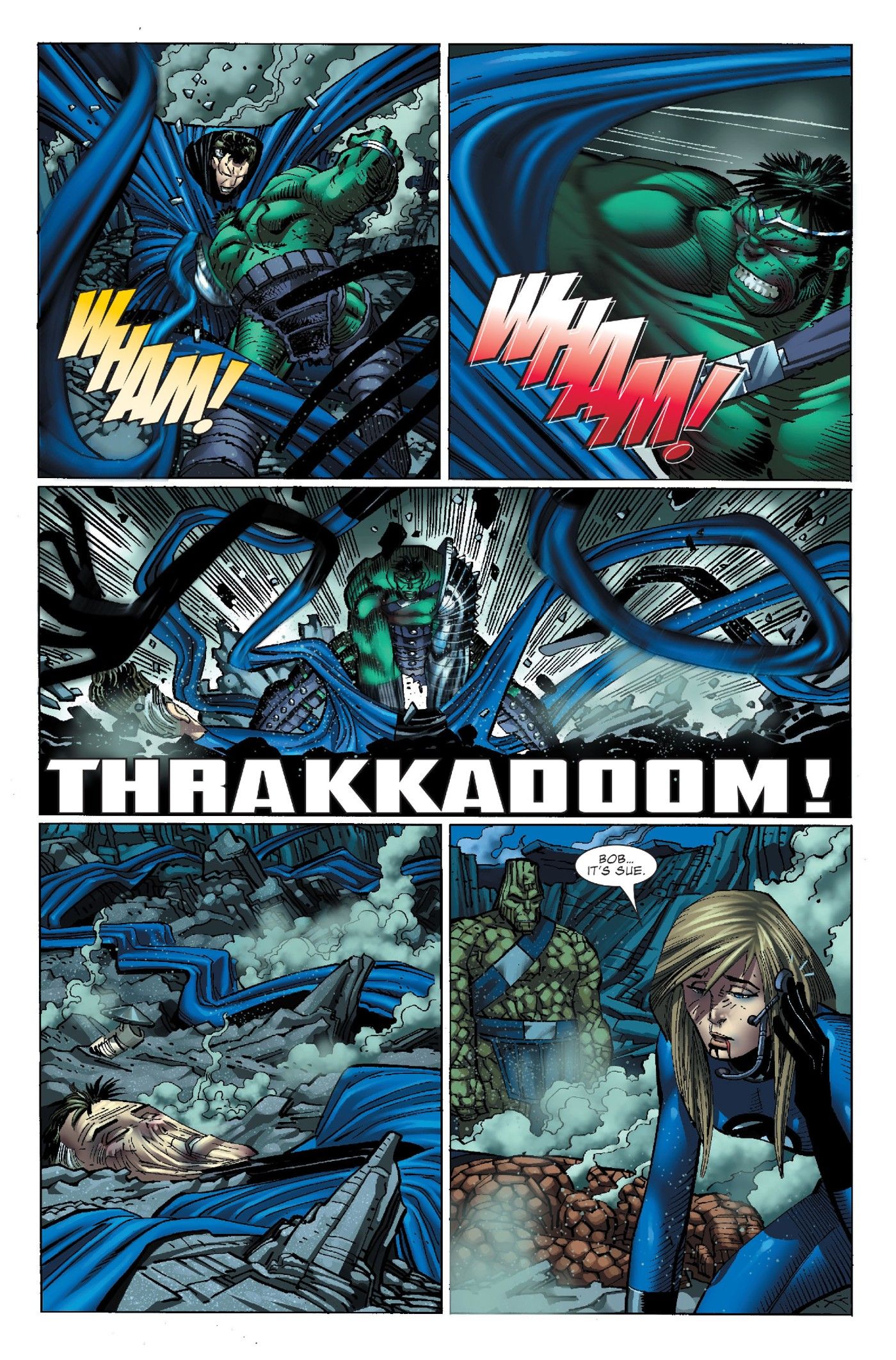
Reed returned to the battlefield when the Hulk came back—wrath incarnate, hunting the architects of his exile. Reed, one of the Illuminati, was among them. The Hulk shattered Reed’s genius with brute force, dragging him into a twisted arena of survival and shame. Reed was implanted with an obedience disc. Forced to fight. Forced to remember that even the best intentions birth monsters.
He survived—only because Hulk chose mercy over vengeance. Because sometimes even rage shows more humanity than logic.
Secret Invasion: When Trust Wears Your Friend’s Face
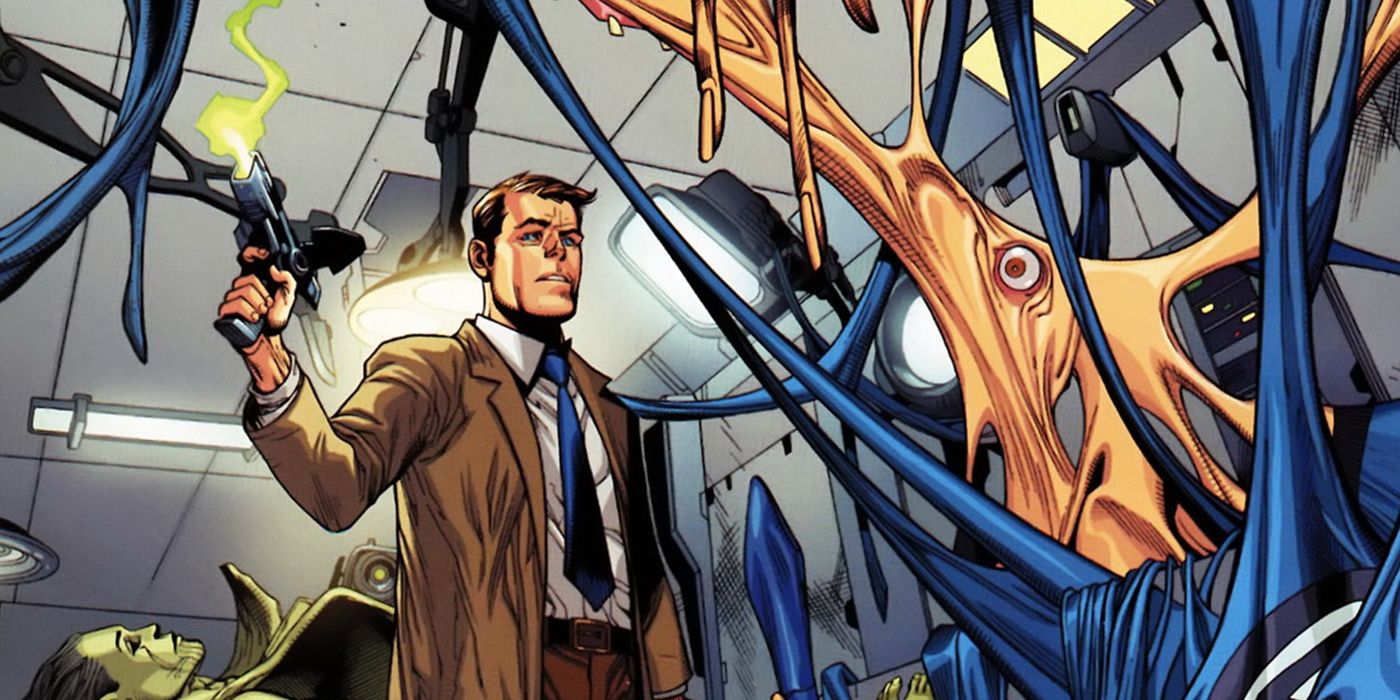
Then came the Skrulls. And Reed, the man who saw all futures, never saw it coming.
A trusted face—Hank Pym—turned into a traitor. Reed was shot mid-sentence, his elastic form unraveling in chaos, stretched like guilt across a Skrull warship’s floor. They paraded him like a prize, a living trophy of how easily Earth’s smartest man could be fooled.

Abigail Brand rescued him. And Reed, torn but unbroken, used his mind as a scalpel. He exposed the invaders with cold, relentless precision. He didn’t just fight back. He became truth. He made the hidden visible. He turned war into clarity.
The Bridge: A Portal into Regret

But clarity breeds obsession.
Haunted by everything—the war, the lies, the losses—Reed built The Bridge. A gateway to alternate realities, where he could peer into timelines that diverged from his own. He wasn’t just searching for knowledge. He was searching for forgiveness in a universe where he’d made better choices.
He saw worlds where Civil War ended differently. Worlds where he’d kept his family intact. Worlds that didn’t need saving because he’d saved them before they broke.
Sue begged him to destroy it. And he did. Publicly. But in secret, he rebuilt it. Because Reed Richards can’t stop. Even when it hurts. Especially when it hurts.
The Future Foundation: A New Hope, Forged from Loss
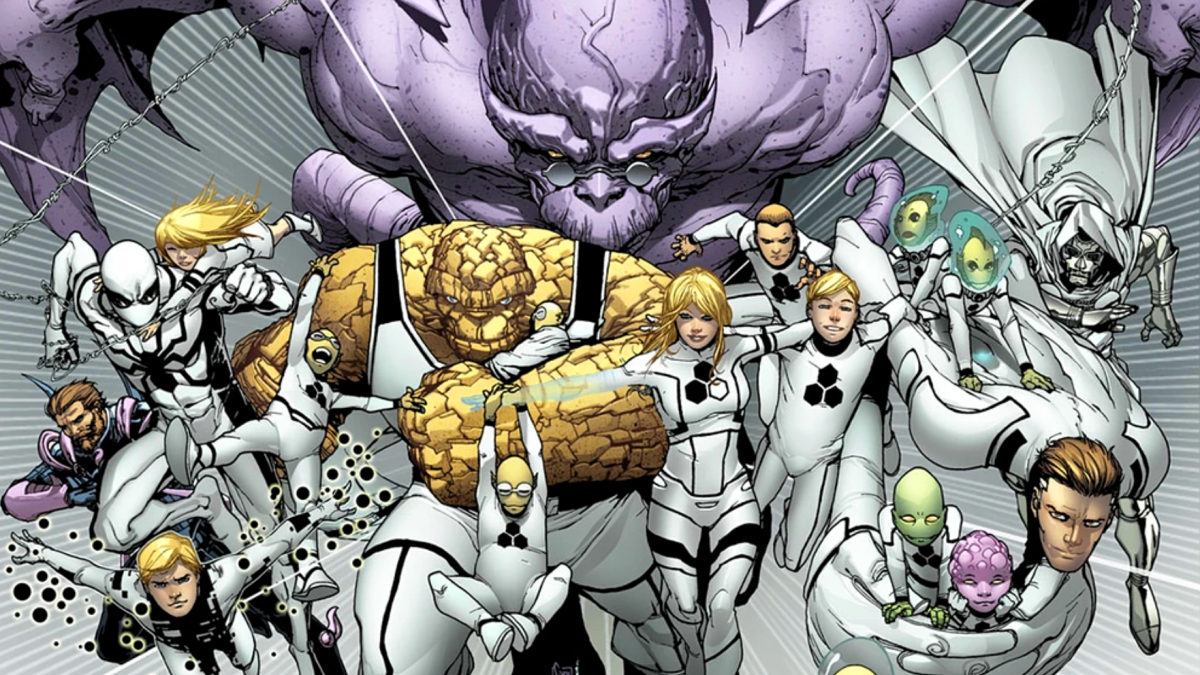
When Johnny Storm died holding back the Annihilation Wave, the Fantastic Four shattered.
In his place, they built the Future Foundation—a sanctuary for minds, for hope, for the next generation. But across the multiverse, echoes of Reed kept appearing. Alternate versions of himself—some twisted, some brilliant, some broken—collided into his world. Reed allied with enemies—Mad Thinker, Wizard, even Diablo—to stop the worst parts of himself from spreading across time like a virus.
When everything collapsed—Kree invasions, the rise of the Cult of the Negative Zone, battles that cracked the Earth’s sky—Johnny returned. Branded by survival, wielding Annihilus like a chained storm.
The Four were whole again, even if the world wasn’t.
Together, they summoned Galactus to end the Kree. But that only invited a greater threat: the Mad Celestials. Beings beyond thought. Beyond strength. Not even Reed’s most dangerous invention—the Hub—could stop them.
But salvation came from the future.
A grown Franklin Richards, their son, returned with Valeria. Children now gods. Franklin healed Galactus. Turned Devourer into Defender. And with a whisper of cosmic will, he ended the threat.
The Voyage Beyond: Chasing a Cure, Hiding the Truth
Later, Reed learned his cells were dying—his body unraveling from years of cosmic stress. So he disguised a desperate search for a cure as a family adventure through space and time.
They learned their decay came from power—not its loss, but its overflow. From being too much for too long. They helped alternate versions of themselves, stripped of power, defeat Doom the Annihilating Conqueror. In doing so, they reset the balance. Restored what was fraying.
But Reed knew something else. That sickness… that fragility… it wasn't just in his cells.
It was in his choices. In the cost of always trying to be the one who fixes everything.
Because that’s who Reed Richards is.
The man who sees a thousand versions of failure—and still tries.
The man who breaks the universe, only to mend it with the same hands that fractured it.
Not a god. Not a hero.
Just a father. A scientist. A dreamer.
A man chasing redemption across time, holding his family close—not in spite of the chaos—but because of it.
The Quiet Man
For all his brilliance, Reed Richards never saw him coming.
A man who didn’t roar, didn’t declare war with thunder or flame. No, this was the Quiet Man—an architect of shadows, who chose to wound the Fantastic Four not through force, but with the cold precision of systemic collapse. He stripped Johnny of his flame. He framed Ben for murder. He had Reed and Sue declared unfit to raise their own children. It was methodical. Personal. And then he abducted Reed—planning to cast him as the villain in a world-saving play of his own making, using the innocent constructs from Franklin’s pocket universe as ammunition.
But Reed, even when bound and bruised, found clarity in chaos. When the Psycho-Man—another puppet master—betrayed his own ally, Reed offered the Quiet Man the only thing he had left: reason. Together, begrudgingly, they deactivated the machine threatening reality. A forced alliance born of desperation, not trust. But it worked. And Reed returned to his family not triumphant, but more aware than ever: the most dangerous threats are the ones that speak softly.
Time Runs Out
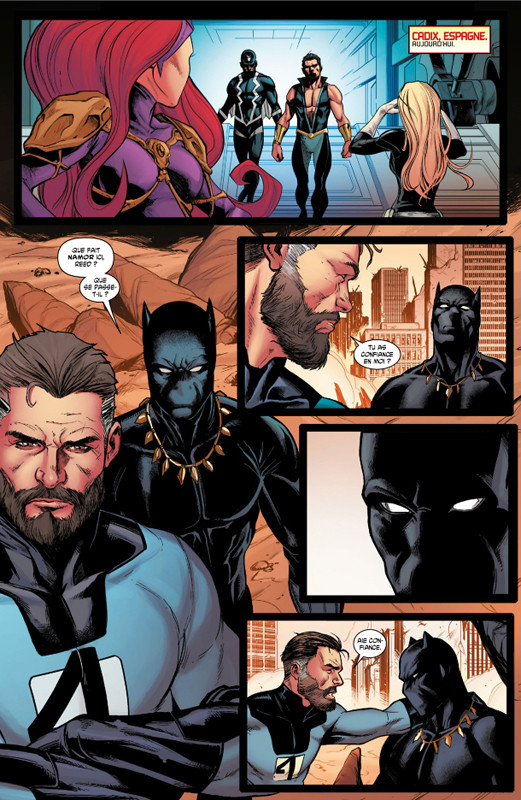
The multiverse trembled—and Reed, once again, was one of the few who understood just how much.
Earths were colliding. Universes dying. And the only way to save your own world was to destroy another.
The Illuminati—a cabal of minds built to prevent disaster—found themselves staring into ethical oblivion. Could they commit universal murder to save billions? Reed tried to solve it. Every angle. Every science. He asked gods, shattered paradigms, tried to build Earth from scratch with Franklin’s powers. But hope decayed like starlight at the edge of a black hole.
Namor broke ranks. Captain America turned on them. Even then, Reed refused to give up. Logic was his shield, science his sword. But the question remained: could intellect save the soul of a man who might one day be asked to push the button?
Secret Wars
And then... everything died.
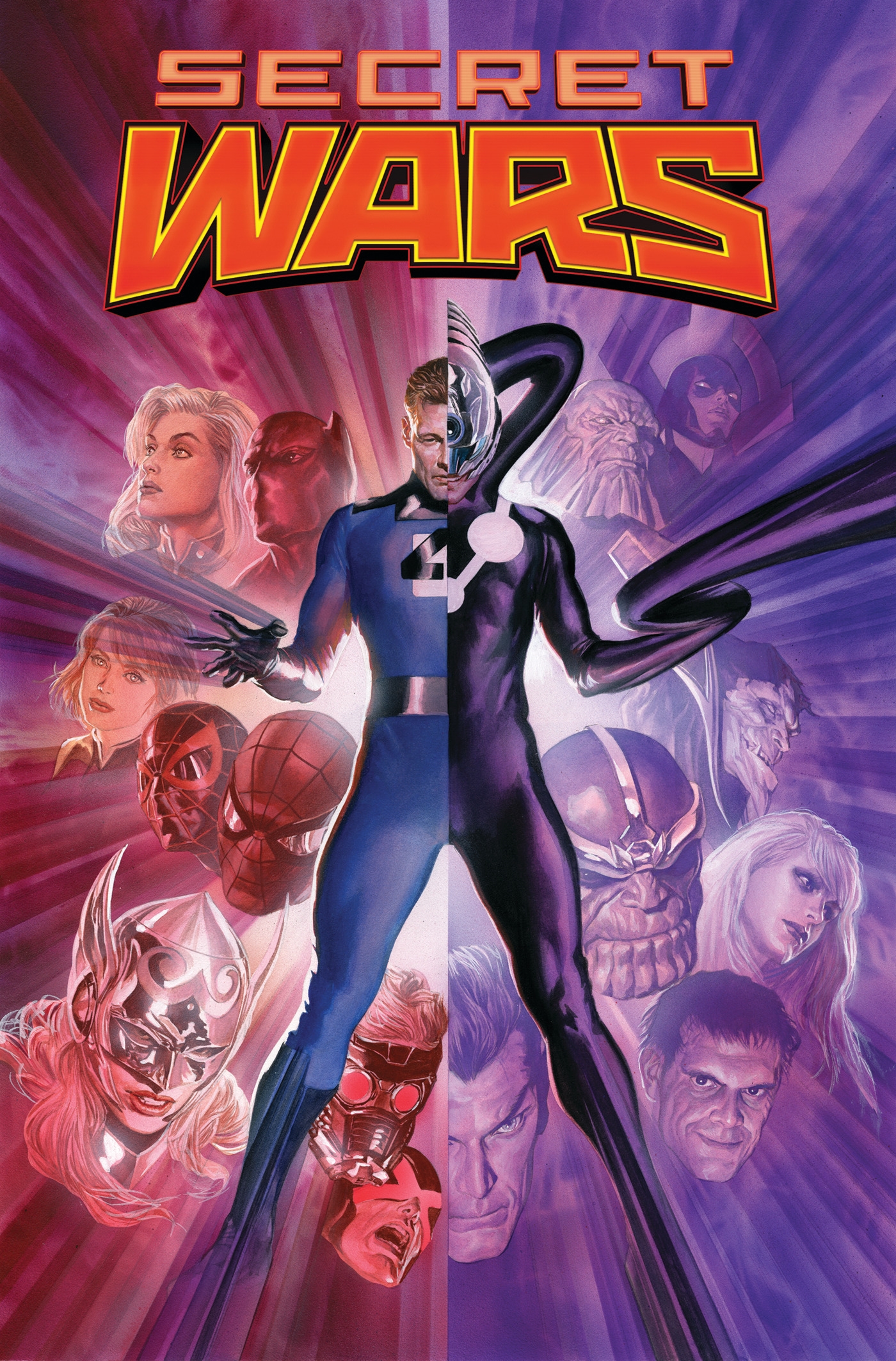
The final incursion came. Two Earths. Two realities. One would survive—if even that.
Reed gathered those he loved onto a lifeboat and aimed it at hope. But hope cracked. The ship broke apart in the void. Sue. The children. Gone.
When he opened his eyes again, there was nothing but Battleworld—a stitched-together monstrosity of broken worlds, ruled by one man who survived with godlike power: Victor von Doom.
And in that twisted kingdom, Doom had stolen everything Reed ever loved—Sue, the children, even the admiration of the people. He wore Reed’s life like a crown.
But Reed didn’t rage. He calculated. He resisted. And when the moment came, he stood before Doom not as a rival, but as a mirror. Doom asked: “Could you have done better?” And Reed answered honestly: “Yes.”
The Molecule Man listened. And with that confession, Reed Richards became God.
Not for glory. Not for vengeance. But to rebuild. To bring back everything lost, everyone forgotten. He resurrected Earth-616. Restored lives. Rewrote destinies. And then, in a final act of compassion, he healed Doom—body and mind—and rewrote his memory to believe Reed was gone, so Victor might find peace in the silence.
Fate of the Four

Years passed in multiversal solitude. Reed, Sue, Franklin, Valeria—their journey became a myth etched in the fabric of a new cosmos. Franklin, once a child with a galaxy in his palm, grew weary. His powers, once infinite, dimmed.
And then came The Griever.
She was not a villain. She was an inevitability. The embodiment of endings. She tore through the universes the Future Foundation had built like sandcastles in the tide.
Reed stood against her not with power, but with legacy.
He summoned every soul who’d ever worn the “4”—every iteration, every past comrade—and showed her the truth: the Fantastic Four weren’t about creation. They were about connection. About family. About refusing to surrender when all else is lost.
Defeated, the Griever left. And the family—scarred, evolved—returned home.
Only a few months had passed on Earth. But inside Reed, lifetimes had unfolded.
Fantastic Four No More
There was a day when the Baxter Building disappeared.
Reed had teleported it into the future, stranding an alien invasion in space. A clever move, but it meant their children—Franklin and Valeria—were gone for a year.
And Reed… didn’t flinch. He stayed calm. Too calm. That hurt worse than anything else.
Even Sue couldn’t understand it at first. But the truth was simple and sad: Reed hurt. He was breaking inside. But he wore silence like armor—because that’s what was expected of him.
Eventually, the Four fractured. They wandered. They grieved. They tried to heal.
They stumbled into towns filled with Doombots acting like people. Discovered a woman—a remnant of Doom’s humanity—preserved in machine. They buried her, not out of necessity, but out of respect. And somewhere in that act of grace, they began to forgive themselves, too.
Later, a parasitic alien would force them to relive the moment the Baxter Building vanished. But instead of falling apart, they stood tall. Together.
The Fantastic Farmhouse
![]()
They returned—not to a skyscraper in Manhattan, but to a quiet farmhouse in Arizona. Aunt Petunia’s old place. The Fantastic Farmhouse.
They cooked meals. Told stories. Fought aliens in the backyard. For a year, they were whole again.
Then the Baxter Building reappeared. With it, their children. Their people. Their past.
And maybe, just maybe, Reed Richards—father, husband, scientist, god—could finally be allowed to rest in the warmth of what he had rebuilt. Not with equations or power, but with love.
Because for all his cosmic calculations, Reed had learned the most important constant of all:
Family doesn’t need to be perfect. It only needs to hold.
The Man Who Stretches Too Far
Reed Richards – Personality
Reed Richards isn’t just the smartest man in the room—he’s the one who keeps forgetting there is a room at all. His mind stretches as far as his body—past the walls, past the moment, into the fabric of what could be. He's a scientist first, an explorer of meaning, always chasing answers in the language of equations and unknowns.
He doesn’t rush into battle. He negotiates with the cosmos, offers parley to invaders if only to study the mechanics of their madness. If you stubbed your toe and you were an alien, Reed wouldn’t bring ice—he’d bring a notebook and ten years of questions. It’s not neglect. It’s awe. The universe speaks, and Reed listens.
But behind the pleasant smile—always there, always gentle—there’s a man who lives with ghosts of unsolved equations. Ben Grimm’s curse weighs on him like a second skin. Franklin’s powers—untouchable, unfathomable—leave sleepless nights in their wake. And sometimes, Reed slips. Into self-hatred. Into silence. Into that soft place where even genius can’t save what it loves.
Still, he's kind. Deeply. Unshakably. A man who once saved Galactus, not out of mercy, but because he couldn’t bear to watch any sentient being die in agony—even a world-eater.
He does things no one understands. Things that betray logic. But to Reed, logic isn’t a cage—it’s a compass. And sometimes, to protect life, you follow it right off the map.
Sue once wondered aloud—if Reed’s eccentricity was born from something neurological, something unspoken. Maybe. Maybe not. But in a world of noise, Reed Richards is the kind of man who hears everything… and still cares enough to keep trying.
The Elastic Soul
(Mister Fantastic – Powers)
His body bends, but it’s his will that truly stretches.
Cosmic rays didn’t just make Reed Richards malleable—they turned his form into a metaphor. He doesn’t break. He reshapes.
He can slip through the tiniest crack, wrap himself into a slingshot, form a glider, flatten to a sheet of paper, or ripple like wind. He can mold himself into a wall to contain explosions or wrap around falling friends like a trampoline. His body can mimic shapes, voices, even people—a human memory foam that remembers everything it touches.
But his power isn't just about what he can do—it's what he’s willing to endure.
Once, when a 150-billion-ton mountain was dropped on Earth’s heroes, it was Reed—crushed, cracked, barely conscious—who absorbed the brunt of the blow before Hulk could lift it. He didn’t scream. He stretched. That’s who he is. He’ll always be the one who takes the hit, first and hardest.
His mind? Just as fluid. Reed has reshaped his brain to think like Kang. He’s mimicked Doom’s voice. He’s rewired his perspective to match alien intelligences. He’s not just elastic in body—he’s elastic in empathy, in imagination, in intent.
And yet, there’s a limit. Not in strength—but in weight. The farther he stretches, the weaker he becomes. It’s poetic, in a tragic way. Because no matter how far Reed reaches—to solve everything, to save everyone—he can’t do it all alone.
He is the rubber band holding reality together. Quietly. Desperately. And every time he stretches to hold one more piece in place, it costs him.
But still—he stretches.
Because Mister Fantastic is not about power.
He's about the refusal to let go.
The Mind That Bends Reality
Reed Richards – Abilities
Reed Richards doesn’t just understand the world—he rewrites its language every time he opens his mouth or lifts a wrench.
They call him a super-genius, but that feels too clinical, too small. Reed doesn’t just invent. He envisions. He connects stars to neurons, particles to purpose. His mastery spans everything—physics, chemistry, biology, robotics, time, dimensions, polymers, and possibilities. He’s a machinist of dreams and a sculptor of the impossible. Some say he's the smartest man on Earth. Some say the smartest anywhere. And they may still be underselling him.
His brain is a living archive—every formula, every variable etched into a memory so sharp, it might as well be carved in cosmic stone. He’s cracked dimensional travel like it was just another route on a subway map. He can build a starship out of garage scraps, or design a synthetic element before breakfast. His patents alone bankroll the entire Fantastic Four without him blinking.
But even a mind like his has limits. And his is beautifully ironic.
Magic.
Where logic dies, Reed stumbles. He can’t compute what won’t be defined. To him, magic is a blank page, and that drives him mad. Not out of arrogance, but out of reverence—for truth, for pattern, for order. And magic? Magic doesn't explain. It simply is.
But that doesn't make Reed any less dangerous in a fight.
He’s a hypnotist—trained. A judo master—silent, exact. His fists strike like thoughts: precise, deliberate, and unrelenting. Don’t let the lab coat fool you. Reed Richards can take you apart in more ways than one.
The Thread That Unravels
But genius has gravity.
Reed is powerful. But he is not alone. The Fantastic Four aren’t just teammates—they are a circuit. A living, breathing bond that echoes through the universe. Together, they resonate. Separated too long—especially across dimensions—and their energy wanes, like stars pulled from orbit. Even Reed dims without them.
And then there’s the physical toll. Stretch too far, too fast… and even his elastic body screams. Flesh tears. Muscle bleeds. The man who bends the cosmos must still obey the fragile laws of being human. He can bleed. He can break.
Even he has a limit.
The Tools of Tomorrow
Reed doesn’t carry weapons.
He carries ideas—stitched into his suit, embedded in every spark of his tech.
His uniform isn’t just cloth. It’s a second skin of unstable molecules—designed not only to stretch with him, but to think with him. His costume is a wearable computer, tracking vitals, scanning dimensions, linking the team together in a real-time web of shared consciousness. If Reed’s thinking it, the suit’s already acting on it.
Need to alert the others mid-crisis? He launches the Fantasti-Flare—a fiery “4” painted across the sky like a symbol from ancient myth. A beacon of trust. A warning. A rallying cry.
His Universal Translator speaks every language—even the ones born in the belly of black holes.
His Memorium Device walks the memory-palaces of strangers, allowing the Fantastic Four to see what others lived through.
And when he needs to access any database, anywhere? He doesn’t need a keyboard. He stretches his fingertips into whisper-thin filaments and plugs them in—his hands literally becoming the interface.
Reed Richards isn’t a man with gadgets.
He is the machine.
A living conduit between what is and what could be.
The Man Beyond the Numbers
Reed Richards doesn’t just read the universe—he rewrites it.
He once took the works of Stephen Hawking and restructured them like a jazz musician rearranging sheet music. Not out of ego—but out of curiosity. Not to prove a point, but to chase one further. That’s how he moves—one step ahead, even when the road hasn't been built yet.
He’s cracked alien languages as casually as others solve crosswords. He’s stood on the edge of known reality, looked into the abyss, and named it The Negative Zone—a discovery that allegedly earned him one of several Nobel Prizes. Not that he ever flashes those accolades. That’s not what drives him.
And when the conversation turns to faith, Reed doesn’t offer certainty—he offers sincerity.
He's agnostic, yes. He doesn’t believe any one human religion holds the ultimate truth. But he does believe in something greater. Something bigger. “Something we can’t totally comprehend,” he once told his son, Franklin. He believes in patterns, in probabilities, in unseen hands and protective grace. He believes there was something watching over them the day the Fantastic Four were born in cosmic fire—and maybe that force still lingers, whispering through the chaos.
Resurrections. Survivals. Second chances. He calls them “almost proof” of a force that needs people like them to stand against the coming dark.
That’s faith—not blind, but earned through experience.
The Science of Soul and Strategy
Reed has always said magic is just science with missing pages. He struggles with it, sure—it doesn’t behave, it doesn’t explain itself. So instead of inventing a new Time Machine, he borrowed from Doom. Because sometimes even a genius must copy when the rules break down.
But that’s never stopped him from imagining futures. Literally.
Based on Asimov’s Foundation, Reed created an entire new field—Psychohistory—his first intellectual child. Using it, he can mathematically map the rhythms of history, the drift of societies. He predicts culture like some people forecast the weather. It’s not prophecy. It’s precision.
The Man Behind the Curtain
Trivia
Even a mind like Reed’s is stitched with human quirks.
He failed his driving test—four times.
He’s been immortalized on a 1970s Marvel Value Stamp, right there with the icons.
His powers, like his personality, flow with the nature of water—fluid, adaptable, essential. In some stories, he is water, the classical element personified.
And though prodigies like Moon Girl and even his own daughter Valeria have surpassed him on paper, they still call him the “smartest man alive.” Not because he has all the answers, but because he’s always looking for better questions.
There was even a time when Tony Stark, wielding the Power Cosmic, gave all of New York City Stark-level intellect—and Reed became... less intelligent. That’s how paradoxical he is. A man so smart, even omnipotence struggles to upgrade him.
He’s fought wars not just in space, but in history itself—serving as a military consultant in the Siancong conflict, where science became strategy and survival wore a human face.
Reed Richards isn’t just a man of science. He’s a man of wonder. A man who bends, not just his body, but the very idea of what’s possible.
He knows that some things can’t be measured.
But that doesn’t stop him from trying.
Subscribe
Sign up to get the latest on sales, new releases and more …
